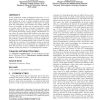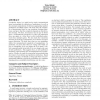33 search results - page 5 / 7 » Manipulation of copeland elections |
CORR
2006
Springer
13 years 7 months ago
2006
Springer
We study the complexity of influencing elections through bribery: How computationally complex is it for an external actor to determine whether by paying certain voters to change t...
SIGECOM
2010
ACM
13 years 8 months ago
2010
ACM
In the traditional voting manipulation literature, it is assumed that a group of manipulators jointly misrepresent their preferences to get a certain candidate elected, while the ...
CORR
2010
Springer
13 years 8 months ago
2010
Springer
One possible escape from the Gibbard-Satterthwaite theorem is computational complexity. For example, it is NP-hard to compute if the STV rule can be manipulated. However, there is...
SIGECOM
2008
ACM
13 years 7 months ago
2008
ACM
We introduce a class of voting rules called generalized scoring rules. Under such a rule, each vote generates a vector of k scores, and the outcome of the voting rule is based onl...
ATAL
2008
Springer
13 years 9 months ago
2008
Springer
Complexity theory is a useful tool to study computational issues surrounding the elicitation of preferences, as well as the strategic manipulation of elections aggregating togethe...


